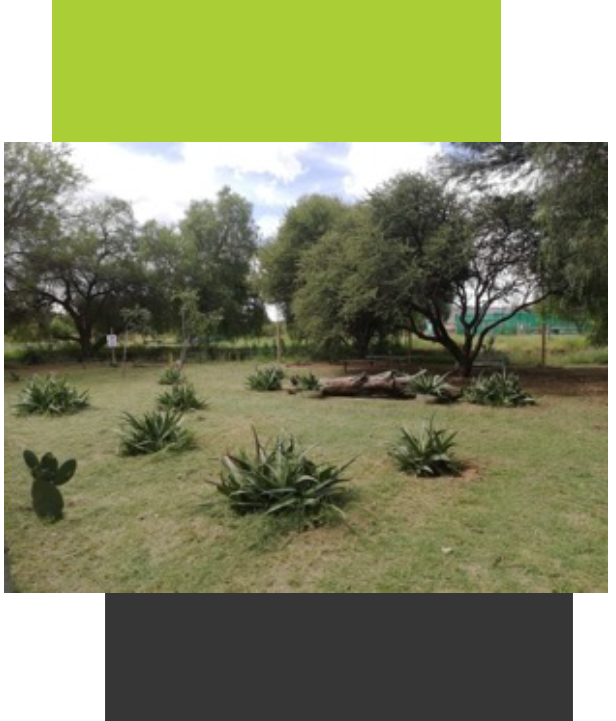Plant Conservation
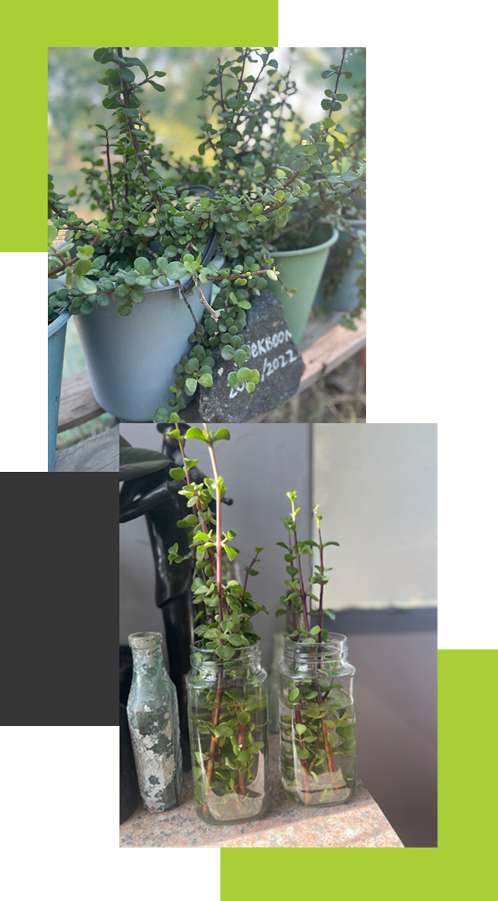
SPEKBOOM PROJECT
Project Start Date: 2021
PURPOSE: Spekboom Nursery / Carbon Sequestration
SPEKBOOM PROPAGATING
Spekboom propagating project was established in the Joint Shaft Greenhouse
ADVANTAGES OF SPEKBOOM PROJECT
- Carbon Sequestration Champion:
Spekboom (Portulacaria Afra) is renowned for its exceptional carbon sequestration capabilities. This succulent is incredibly efficient at capturing and storing carbon dioxide, making it a powerful tool in the fight against climate change. - Biodiversity Support:
Spekboom is a native South African plant that provides habitat and food for various insects, birds, and small mammals. By propagating Spekboom, the project contributes to the enhancement of local biodiversity, creating a more resilient and balanced ecosystem. - Erosion Control:
The dense, water-retaining leaves of Spekboom help control soil erosion, making it valuable in areas prone to degradation. Its ability to stabilize the soil contributes to overall land conservation efforts. - Water-wise Plant:
Spekboom is adapted to arid conditions and is known for its water efficiency. This makes it suitable for regions facing water scarcity, as it requires minimal water once established. - Economic Opportunities:
Spekboom propagation projects can generate economic benefits for local communities. The plant's popularity in landscaping and its potential use in carbon offset programs offer avenues for income generation. - Educational Tool:
Spekboom propagating projects serve as educational tools, raising awareness about the importance of indigenous plants, biodiversity conservation, and climate change mitigation. - Adaptability to Different Soils:
Spekboom is adaptable to a variety of soil types, including poor and rocky soils. This adaptability makes it suitable for reforestation and land rehabilitation initiatives in diverse environments.
Global Recognition
The carbon sequestration potential of Spekboom has gained international attention.
It has been recognized as a valuable tool in climate change mitigation strategies.
Low Maintenance
Once established, Spekboom is low maintenance requiring minimal care and water.
A sustainable project aiming at long term positive impacts
Portulacaria afra:
Spekboom, also known as
Portulacaria Afra, is a champion in carbon sequestration.
Traditional Uses: In South Africa, where Spekboom is native, the plant has traditional uses. It has been used for medicinal purposes, and the leaves are sometimes eaten as a remedy for dehydration.
Cultural Significance: Spekboom holds cultural significance in South Africa, where it is sometimes referred to as "Elephant's Food." Its presence in local folklore and traditions adds to its cultural importance.
Edible & Nutrient Rich: The succulent leaves of Spekboom are not only visually appealing but are also edible. Rich in Vitamin C.
Rooting abilities: Spekboom exhibits remarkable rooting abilities. Broken stems or fallen leaves can take root and grow into new plants, enhancing its natural propagation.
Propagating at Ekapa:
There are various methods used for Propagating of Spekboom.
At Ekapa cuttings from mature plants is the method of choice.
- Choose healthy cuttings from mature adult plant.
- Remove leaves from the lower part of the cutting.
- Use well drained soil / compost from the Ekapa Worm Farm
- Keep soil moist until roots have developed.
- Monitor growth and take more cuttings from mature plants.
Desert Rose Succulent Project
Project Start Date: 2020
PURPOSE: GARDEN IMPROVEMENT
We are particularly proud of the establishment and expansion of our desert rose garden. From small beginnings with only two original flowers, our Environmental Department has been able to propagate these into a well-established garden.
The original petals were placed in strategic places in a pot and from each petal a new flower formed over time. To propagate, petals are split and planted during the first two weeks in April. Some of the seedlings have been potted and given to employees as tokens of appreciation.
The Desert Rose Succulent propagating project holds significance for gardening as it allows employees to cultivate these resilient plants, promoting biodiversity in the Ekapa Gardens.
Water Wise Gardening promotes the planting of succulents. The Dessert Roses have also been handed to employees as recognition awards.
Propagation aids in preserving and expanding the species, contributing to ecological balance while providing unique and aesthetically pleasing additions to garden landscapes.
Planting & Care
Transplanting
The establishment of the Desert Rose Succulent Project in the Joint Shaft Greenhouse contributes to the rehabilitation and closure of the mine while promoting sustainable development in the area.
The project will be in line with the environmental legislation in South Africa and will help to ensure the long-term ecological and social sustainability of the region.
Individual Plants are given to employees as tokens of appreciation. In doing so, increasing the number of plants planted by Ekapa which is in line with the Ekapa‘s vision of PROUD TO PROVIDE
Individual plants are also handed out to employees as a token of appreciation.
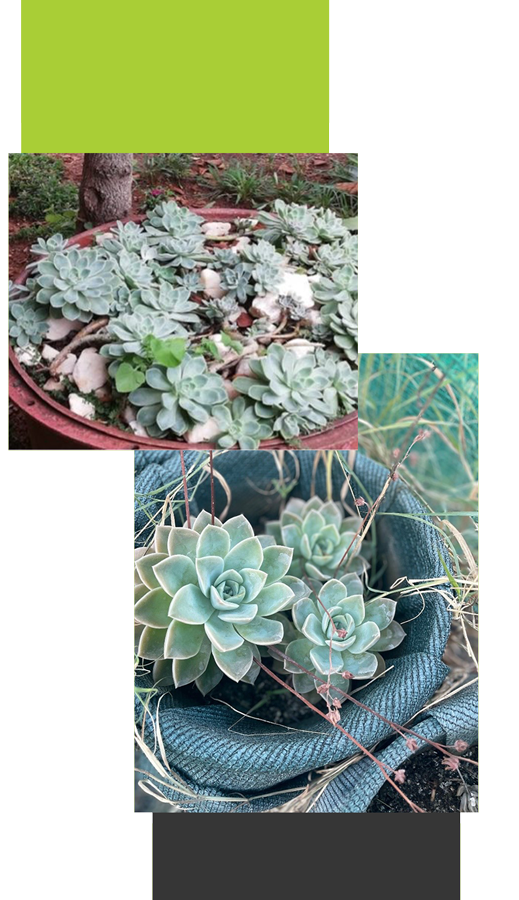
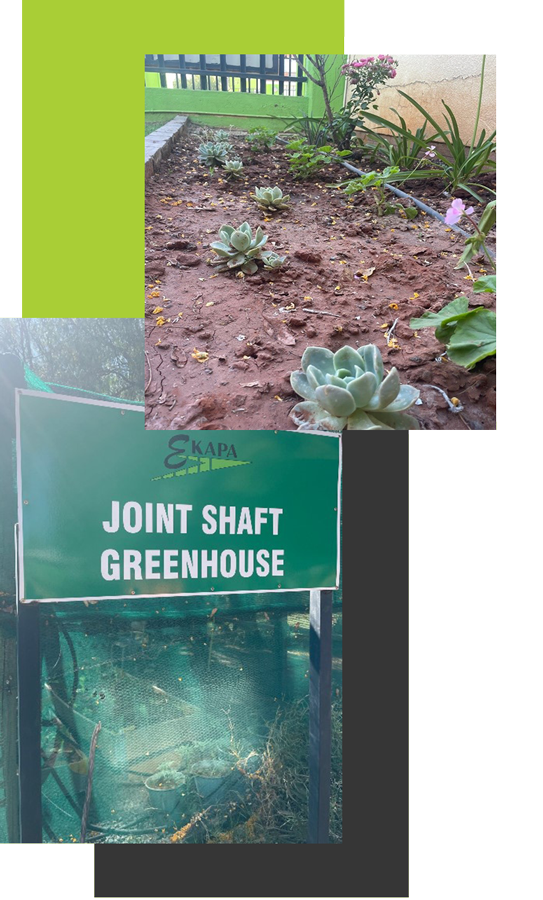
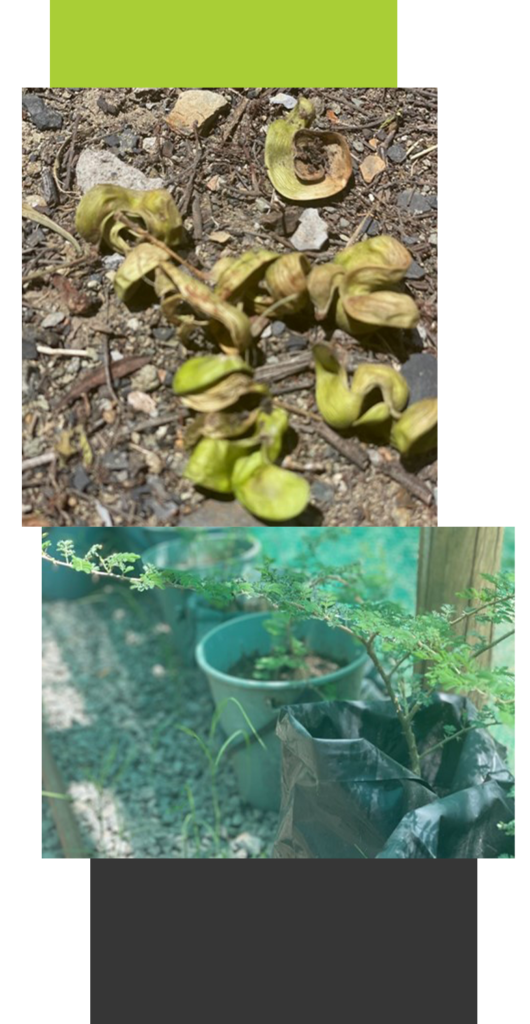
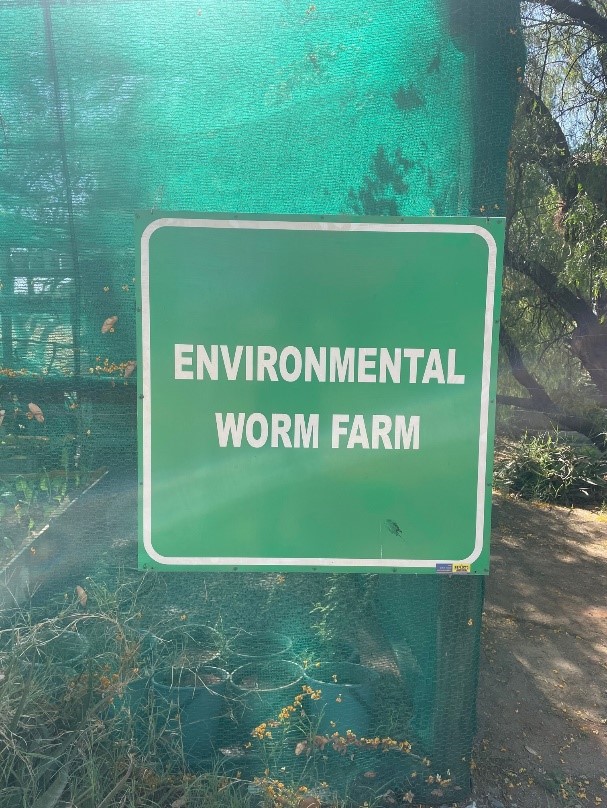
Acacia Tortillas Project
Project Start Date: 2021
PURPOSE: ACACIA NURSERY PLANTED FROM SEED – REHABILITATION PURPOSES / CARBON SEQUESTRATION
Acacia From Seed
The primary objective of this project is to establish an Acacia Tortillas nursery grown from seed at Ekapa to aid in the rehabilitation and closure of the mine.
This project will contribute to the sustainable development of the area.
This project meets the requirements of Biodiversity on Mine.
Ekapa is continuously doing rehabilitation. Areas where established trees can be planted for rehabilitation purposes have been identified.
Corporate Social Investment
From a corporate social investment perspective, the project allows the mine to demonstrate its commitment to responsible and sustainable business practices.
The Acacia Tortillas Nursery project can potentially deliver environmental, social, and economic benefits, making it a valuable initiative for the mine and the broader community.
This project is in line with the environmental legislation in South Africa and will help to ensure the long-term ecological and social sustainability of the region.
Over and above the carbon sequestration, this nursery will contribute to improved soil structure, water retention and biodiversity, creating a resilient and ecologically balanced environment.
Seed Collection And Preparation
Drought Resistant: Adapted to arid environments. Acacia tortillas have a deep root system allowing access to water from lower levels. This helps the tree to survive in challenging circumstances.
Wildlife Habitat: Thorny branches and foliage provide habitats for various bird species, small mammals and insects.
Pollinator: The flowers of Acacia Tortillas attract pollinators butterflies and Bees
Carbon Sequestration: Benefits for Ekapa Acacia Project goes hand in hand with the Ekapa Bee Project and the Ekapa Worm Farm Project.
Planting And Care:
Project Costs
Seeds: Zero Cost (Seeds collected from surrounding adult trees)
Compost used is from the Worm Farm Project
Trees are housed in the Joint Shaft Greenhouse until they are strong enough to be planted out.
Canopy Project
The destruction and disturbance of the environment lead to a wide range of environmental issues, such as landscape degradation, erosion, loss of biodiversity, devaluation of land, and the invasion of alien plant species which use more natural resources than native species.
The disturbance of the environment caused by mining is combatted with rehabilitation. The complete rehabilitation of a diamond mining area is complex with many hurdles to overcome before rehabilitation can be regarded as successful. The lack of organic material within diamondiferous kimberlite creates challenging conditions for plant growth and erosion is a major concern. Mixing topsoil and organic material, such as horse manure, into the kimberlite aids plant growth but does not help to prevent erosion in most cases.
This is why the environmental team at Ekapa has established the Canopy Project. The extensive root system of many of the South African indigenous trees can assist to prevent and minimise erosion in rehabilitated areas. Growing indigenous trees from seeds and planting them in strategic locations along newly rehabilitated areas will increase soil stability and reduce erosion, also aiding other plant growth.
Besides erosion control and soil stability, the indigenous trees will also attract wildlife and birdlife to the rehabilitation area resulting in increased biodiversity.
The list of indigenous trees suited to Ekapa’s rehabilitation areas includes:
- Acacia xanthophloea (Fever Tree)
- Ziziphus mucronate (Buffalo Thorn)
- Acacia caffra (Common Hook Thorn)
- Acacia erioloba (Camel Thorn)
- Acacia karroo (Sweet Thorn)
- Acacia tortilis (Umbrella thorn)
- Celtis Africana (White Stinkwood)
- Olea europaea (Wild olive)
- Searsia lancea (Karree)
- Senegalia mellifera (Swarthaak)
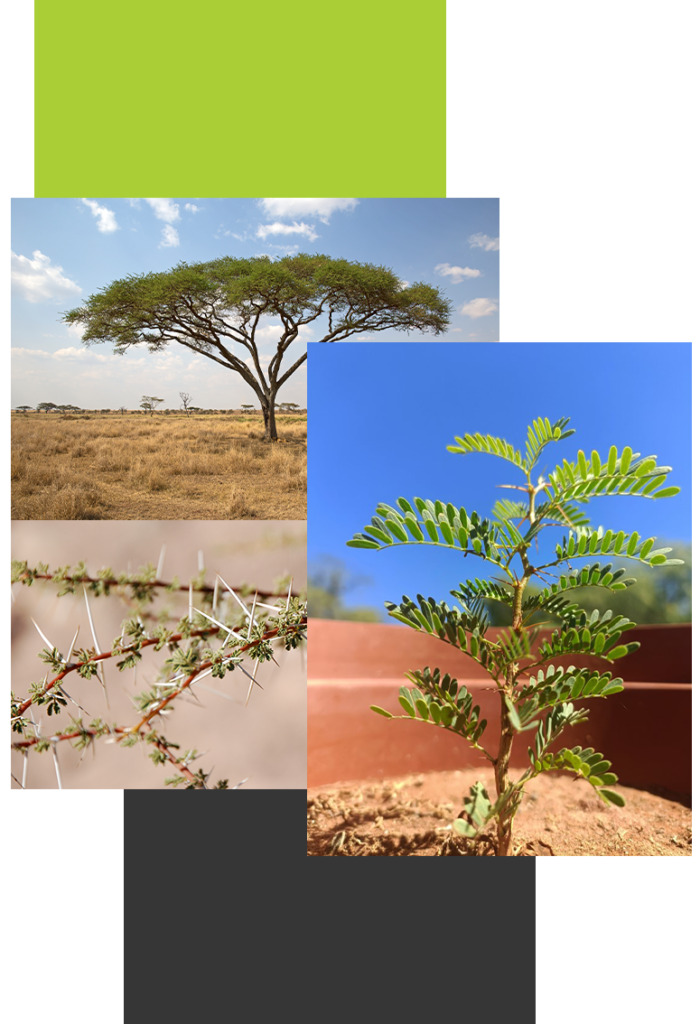
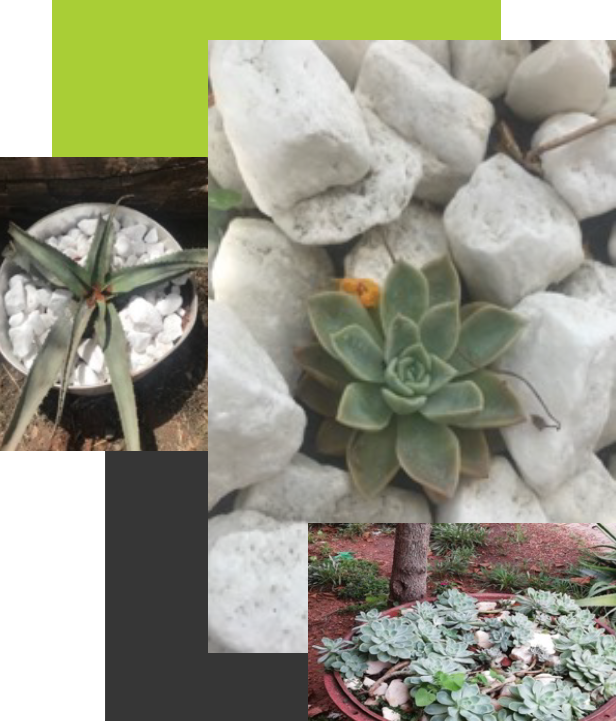
Water-Wise Gardening
Through teamwork and ingenuity, we established a succulent garden under irrigation. Succulents are ideal for the Kimberley area as they are adapted to store water in arid (dry) conditions and high temperatures with their thick, fleshy leaves and waxy coating.
They also have a high mineral level with certain varieties such as the Aloe Vera and Aloe Ferox used for medicinal purposes. Furthermore, they release 10% more oxygen in a 24-hour cycle than most other vegetation and absorb contaminants from the air, converting them into harmless substances.
Aloe Ferox Propagation
Our aloe ferox garden is aesthetically pleasing and environmentally conscious. And it is also a symbol of pride for our employees.
Originally there were only four plants. The Environmental team carefully split and planted these. Initially the plants took strain and it was doubtful whether they would survive. They, however, weathered the storm and we are proud to say that we did not lose any of the those that were planted.
From the original four, we now have 28 plants close to the Joint Shaft water front. Every season the plants can once again be split and we will be encouraging more water-wise gardens in and around the mine.
